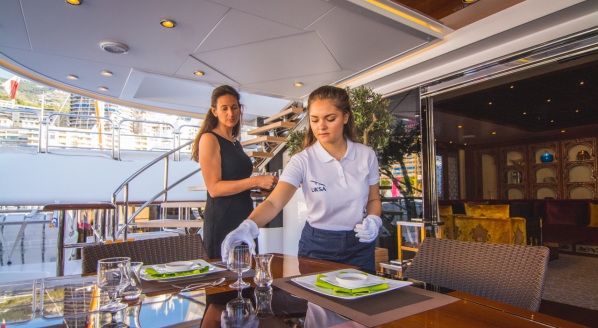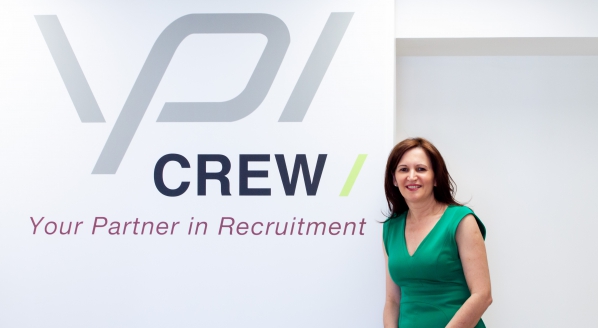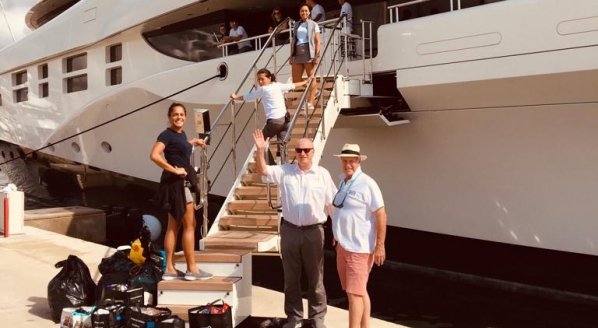Issues of longevity
How can the superyacht industry be better presented as a long-term career path for crew?
The industry often bemoans the impact of transient crew – those who want to work on superyachts for a few years to make some money and then leave. A simple way to increase crew longevity in the industry would be to present the sector as a fruitful career pathway to retain crew for longer as well as attract those with longer-term career prospects. By offering long-term career paths, the industry can attract the most professional candidates.
A big part of this would mean introducing more professional employment packages. “The industry can find it difficult to retain talented crew and often this is due to a lack of balance between crew work and personal life,” says Lien Eggermont, senior yacht placement consultant at Viking Crew. “Especially within junior roles, where rotation packages are non-existent, working on superyachts can make someone’s personal life challenging, so it is not seen as a long-term career. Unfortunately, because the industry is so rigid with giving crew time off, it is often not possible for some to maintain it as a long-term career.”
Another factor that would help to encourage longer careers in the industry is ensuring crew have access to continual professional development. “We sell a lot of mandatory training, but we really struggle to sell non-mandatory training,” said John Wyborn, co-founder and director Bluewater, who was speaking during a panel discussion at The Superyacht Forum 2019. “The industry should be setting out the standard of the skill sets that we want our crew to have and we should be training for them. It shouldn’t matter what the MCA says; it should be us who actually determines the skills that we want our crew to have, especially with entry-level crew.”
“The industry should be setting out the standard of the skill sets that we want our crew to have and we should be training for them...”
This includes having a better culture of on-board mentoring throughout the industry, something that is often found lacking. “We run the Officer of the Watch navigation and radar course, which is supposed to be a fairly advanced level of navigation, but it isn’t because the students have all forgotten [what] they have ever learnt on their Yachtmaster course,” added Wyborn. “Crew are not prepared for the courses and it is because there is no support for learning on board. Whether it’s mandatory or non-mandatory training, the culture of learning in our sector is rubbish and we have to change that as a matter of urgency.”
Chloe McFarnell, yacht placement consultant at Viking Crew, agrees there would be an improvement in crew retention if owners invested more in training. “You have to keep crew interested by showing professional development. If you feel disposable, you are not going to be giving your best,” she explains. “Yachts should encourage career development by sponsoring courses or even hiring trainers to come on board. If the yacht’s programme allows it, the chef should be encouraged to go to a local farm and taste the local produce, or the stews to visit a local vineyard to learn about local wines.”
The industry should also enable easier transitions into shoreside roles so that crew would not see their time in the industry as a gap year but rather as a potential stepping stone to a fulfilling career that includes time at sea and time ashore. For example, a broader acceptance of GUEST – the training and assessment standards available for interior superyacht crew – would act as recognition of the high level of service achieved by interior crew.
“It is about time that managers, recruitment companies and captains started recognising and asking for GUEST,” added Wyborn. “This would mean that crew could make an easier transition to a boutique hotel group, private jet or many other organisations where a high standard is employed.”
Superyachts can create the right on-board environment for fostering longevity through training, employment packages and on-board working conditions. While there will always be a need for transient crew to some extent, the industry should be looking to attract more career-minded crew into yachting – to professionalise the industry and, consequently, enhance the experience for owners and clients on board.
Profile links
NEW: Sign up for SuperyachtNewsweek!
Get the latest weekly news, in-depth reports, intelligence, and strategic insights, delivered directly from The Superyacht Group's editors and market analysts.
Stay at the forefront of the superyacht industry with SuperyachtNewsweek
Click here to become part of The Superyacht Group community, and join us in our mission to make this industry accessible to all, and prosperous for the long-term. We are offering access to the superyacht industry’s most comprehensive and longstanding archive of business-critical information, as well as a comprehensive, real-time superyacht fleet database, for just £10 per month, because we are One Industry with One Mission. Sign up here.
Related news

Coronavirus: preventative measures and advice for the maritime industry
Information provided by the IMO and the WHO
Crew

Creating pathways for prospective crew
Can the superyacht industry improve recruitment strategies to address the shortage of quality crew?
Crew

Regulating mental health
How is the superyacht industry paying more attention to the health and wellbeing of seafarers?
Crew

Blue Monday highlights mental health issues
Nautilus International is calling for the industry to pay closer attention to the mental wellbeing of crew
Crew

YPI Crew acquires Edmiston recruitment
In a ‘strategic alliance’ YPI Crew has now taken on Edmiston’s recruitment team
Business

Superyacht industry makes charitable donations in Palma
Yachting Gives Back is a new charity that enables the yachting industry to help alleviate poverty in the Balearics
Crew
Related news
Creating pathways for prospective crew
6 years ago
Regulating mental health
6 years ago
Blue Monday highlights mental health issues
6 years ago
YPI Crew acquires Edmiston recruitment
6 years ago
The next generation of superyacht crew
6 years ago
Crew welfare issues
6 years ago
NEW: Sign up for
SuperyachtNewsweek!
Get the latest weekly news, in-depth reports, intelligence, and strategic insights, delivered directly from The Superyacht Group's editors and market analysts.
Stay at the forefront of the superyacht industry with SuperyachtNewsweek




